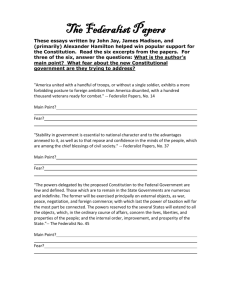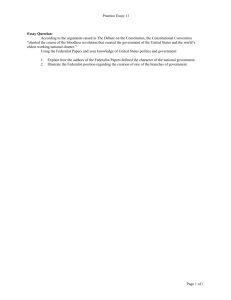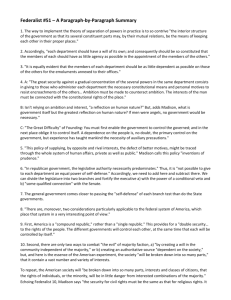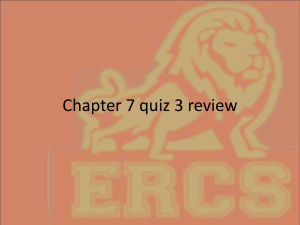Federal Representation: The Design of the Thirty
advertisement
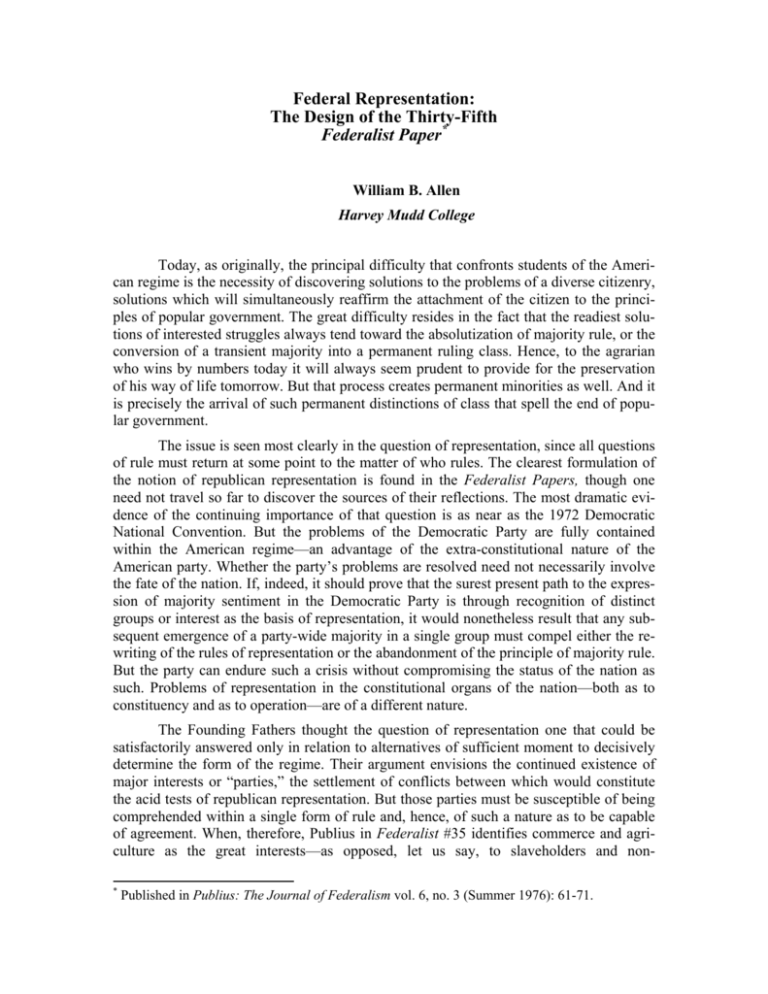
Federal Representation: The Design of the Thirty-Fifth Federalist Paper* William B. Allen Harvey Mudd College Today, as originally, the principal difficulty that confronts students of the American regime is the necessity of discovering solutions to the problems of a diverse citizenry, solutions which will simultaneously reaffirm the attachment of the citizen to the principles of popular government. The great difficulty resides in the fact that the readiest solutions of interested struggles always tend toward the absolutization of majority rule, or the conversion of a transient majority into a permanent ruling class. Hence, to the agrarian who wins by numbers today it will always seem prudent to provide for the preservation of his way of life tomorrow. But that process creates permanent minorities as well. And it is precisely the arrival of such permanent distinctions of class that spell the end of popular government. The issue is seen most clearly in the question of representation, since all questions of rule must return at some point to the matter of who rules. The clearest formulation of the notion of republican representation is found in the Federalist Papers, though one need not travel so far to discover the sources of their reflections. The most dramatic evidence of the continuing importance of that question is as near as the 1972 Democratic National Convention. But the problems of the Democratic Party are fully contained within the American regime—an advantage of the extra-constitutional nature of the American party. Whether the party’s problems are resolved need not necessarily involve the fate of the nation. If, indeed, it should prove that the surest present path to the expression of majority sentiment in the Democratic Party is through recognition of distinct groups or interest as the basis of representation, it would nonetheless result that any subsequent emergence of a party-wide majority in a single group must compel either the rewriting of the rules of representation or the abandonment of the principle of majority rule. But the party can endure such a crisis without compromising the status of the nation as such. Problems of representation in the constitutional organs of the nation—both as to constituency and as to operation—are of a different nature. The Founding Fathers thought the question of representation one that could be satisfactorily answered only in relation to alternatives of sufficient moment to decisively determine the form of the regime. Their argument envisions the continued existence of major interests or “parties,” the settlement of conflicts between which would constitute the acid tests of republican representation. But those parties must be susceptible of being comprehended within a single form of rule and, hence, of such a nature as to be capable of agreement. When, therefore, Publius in Federalist #35 identifies commerce and agriculture as the great interests—as opposed, let us say, to slaveholders and non* Published in Publius: The Journal of Federalism vol. 6, no. 3 (Summer 1976): 61-71. W. B. Allen slaveholders—it is clear that the horizon is not unlimited. Some forms of opposition cannot be reconciled. On the other hand, in the broad categories of commerce and agriculture we may still discern many lesser oppositions. In turning to the founding to consider the question of representation, ever present is the question of how far America is yet ruled by that model. What makes the question significant is the view that the opposition between commerce and agriculture has been superseded. By what has it been superseded? No one has offered a convincing suggestion, and yet the relevance of the founding to the present would seem partially to rely on our ability to do so. An attempt at a new characterization was Charles Reich’s “New Property.”1 But Professor Reich did not proceed so far as either to demonstrate the paramount interest of those holding the new property or even to suggest the nature of an equally broad contending interest. To understand the “New Property,” we must assume a decisive resolution of the original division between commerce and agriculture as to kinds of property. That is to say, the two have been homogeneously reduced to a single kind of property. Call it capital if you wish. Then might be raised the question: what distinction as to sources of property is yet possible to characterize modes of life? That is, from capital, what sources of income are possible, and do they still permit distinctions as fundamental as the original distinctions? Professor Reich’s response is that the sources are fundamentally public and private (though modes of life are essentially homogeneous and unquestioned in his analysis). Income may be generated either by private exploitation of the growth capacity of capital; or it may be derived from the taxation of property. Joining John C. Calhoun, he divides the essential classes into the tax producers and the tax consumers. The “New Property” is the property held by the tax consumers, whether these last receive direct tax property or receive private property by virtue of some tax-related mechanism, such as licensing. Thus, the sphere of the public need not be defined simply as the totality of policy-making mechanisms. It may be understood as comprehending all those interests essentially, rather than incidentally, dependent on public policy for the opportunity to generate income. In those terms, there could exist two great classes: the public and the private. To determine whether the germ of a new characterization is in Professor Reich’s article—or whether some other candidates fulfill that role—the student of American institutions must develop at least the rudiments of a characterization of major parties. It is clear that they must be comprehensive, for example. They must also fundamentally embody some choice as to the form of the regime in their very operation. And their principles or interests must be susceptible of indirect rather than direct representation. These broad requirements emerge from a consideration of Federalist #35. They—and more particular requirements—are the result of the founders’ consideration of the requirements of representation in the context of a new Federal Constitution. The explanatory power of their defense depends upon the accuracy of their portrait of the original parties. To judge of that accuracy, it is first necessary to form their argument as a point of departure for a new inquiry into the nature of federal representation. America’s founding fathers were conscious of the newness of their enterprise. This consciousness serves to confirm not only their ambition but their faith in new-found 1 Charles Reich, “The New Property,” The Yale Law Journal 73, no. 5 (April 1964): 733-87. 2 Federal Representation: tools of political construction. The design of representation presented the chief obstacle to be overcome. Though the initial view of the newness of their approach to representation is corrected in Federalist #63, they maintain early that it is through the modern form of representation that a decisive break is made with the ancient world.2 But the distinctions between ancient and modern political life go deeper than that. It is a radically different form of republican life that necessitates a principle of republican rule unknown to the ancients. It was decided once and for all that might cannot make right. In its extreme form, that means that no virtue is inherent in strength nor in the things required for strength. Virtue becomes, indeed, antithetical to strength. In this manner, the standard of right was wholly dissociated from those endeavors necessary to ensure the continued existence of right. Hence, men’s attentions could be wholly turned towards the virtues of peace, as an ultimate goal to be immediately possessed. Once it was understood that the virtue of the warrior cannot be the end of political life, that ancient example of virtue had to be abandoned.3 The new republic replaced the citizen’s virtue with the citizen’s interest as a safeguard for decent politics. But the nurturing of interests in the public required, above all, commerce. Yet, alone, that was thought insufficient. There had been commercial republics before, but they were still among those “petty republics” which could not defend themselves. The modern republic, then, was formed to exceed the ancient republic with respect both to internal “happiness” and external power. The fulfillment of these conditions forms the basis of the problem of federal representation. The one condition requires extensive commerce, while the second requires extensive force and territory. The Federalist Papers is largely devoted to a discussion of the advantages and disadvantages involved in combining and distinguishing these problems of extent.4 As the combination of an extensive commerce with an extensive territory limits the possibility of republican tyranny, it raises the question of the nature of that representation which must be peculiar to decent republican government. The thirty-fifth Federalist Paper provides a midway answer which permits us to connect the circumstances which make the representation necessary5 with the form that it must take.6 Publius begins with the understanding that a republic must be firmly founded. The republic is defined as that “government which derives all its powers directly or indirectly 2 Hamilton, Madison, and Jay, The Federalist Papers, Introduction by Clinton Rossiter (New York: New American Library, 1961); Essays #14 and #9, if we understand the extended territory discussed there in terms of its coincidence with the confederal republic—with emphasis on “republic” rather than “confederal.” Further references will be to the same volume and in terms of the essay number. 3 Cf. Aristotle, Politics, 1255a-1255b4; with Hobbes, Leviathan, end of ch. 15, chs. 22 and 26, and ch. 29, pp. 174 and 10-20. 4 See my “Theory and Practice in the Founding of the Republic,” Interpretation, 4, no. 2 (1974): 79-97. 5 Federalist #’s 9 and 10. 6 Federalist #60 and #’s 61-63. 3 W. B. Allen from the great body of the people;” that is, from the whole society as nearly as possible.7 Genuine founding of republican government is rooted in consent, and consent is rooted in an equality of rights. But this does not establish a basis for the direct or plebiscitary action of citizens, one or some, upon others. Representation is secondary; it is the artifice, created in the act of founding, which establishes the form of governmental action. Those who so govern must be “persons holding their office during pleasure for a limited period, or during good behavior.” The limitation of republican representation derives from the nature of republican liberty, which requires not only that power come from the people, “but that those entrusted with it should be kept in dependence on the people by a short duration of their appointments;….”8 Dependence protects the indivisibility of sovereignty in spite of the fact that citizens alienate their collective legislative capacity9—an absolute necessity for the establishment of federal representation. The principle of representation broadly based is but the mirror of the founding. That is, it is the power in the people that flows from the people. In the first instance, the people exercise its power in founding the system; in the second instance, the very exercise of power delegates the people’s power to representatives. Hence, the nature of representation is such that all power must flow from the people as directly as feasible. “The streams of national power ought to flow immediately from that pure, original fountain of all legitimate authority.”10 This basis of republican representation is, among a range of possibilities, the necessary mean in an expressly republican government intended to provide for more than the common defense. Publius judged it a consequent principle that the great legislative branch, the House of Representatives, was to be chosen for short terms and kept strongly dependent on the people. When, therefore, the House was attacked as the nursery of oligarchs, Federalist #35 confronted the dual task of defending the republican character of its composition and the necessity of its mode of operation. Though “... the objection is leveled against a pretended oligarchy, the principle of it strikes at the very root of republican government.”11 That is, the anti-federalist preference for direct representation of interests as interests was anti-republican. Their objection, then—tied to the other that the House was insufficiently numerous to represent all the different classes of citizens,12— appeared both impracticable and unnecessary. In fact, there can be no alternative resolutions to the problem of republican representation if Federalist #35 is accurate. Representation must be so constructed as not only to be faithful to the notion of popular government but also to facilitate on the basis of republican principles the safest solutions to the 7 Federalist #39. 8 Federalist #38. In the same moment, stability seeks to assure “that the hands in which power is lodged should continue for a length of time the same.” 9 Federalist #’s 63 and 15. 10 Federalist #22 11 Federalist #57. 12 Federalist #35. 4 Federal Representation: greatest questions. Beyond the argument that a free vote makes automatic representation of particular interests impossible, Hamilton suggests that the principles of Federalist #10 must be understood in terms of the Great Struggle between the Great Interests: commerce and agriculture. The struggle is decided, in the final analysis, only by the growth of a class of men who “truly form no distinct interest” in society. These are the men of the “learned professions.” They arbitrate the differences between, and in fact determine whether the Constitution will pursue, the goals of the one and/or the other. This is not a generally advanced interpretation of the Federalists’ view and thus requires some justification. That justification is found in the organization and implications of Federalist Paper #35. It is there that Alexander Hamilton deals with the charge that only the well-to-do will be represented in Congress and that the interests of the yeomanry will be neglected. Of course, Madison, in #10, has preemptively dealt with the charge as well. Yet, in the Federalist Papers #60-63, both Hamilton and Madison return to the theme once again, and in a manner which suggests that essay number thirty-five strikes the balance of the divergent chords in their analysis. In Federalist #60, Hamilton both summarizes and reflects the cogency of the argument in Federalist #10. However, he adds, But the circumstances which will be likely to have the greatest influence in the matter will be the dissimilar modes of constituting the several component parts of the government.13 This emphasis on the benefits to be derived from contrasting modes of selection of representatives is at once an affirmation of the importance of bestowing still more particular attention on the character of representation than was possible at #10. It is the coupling of an extensive territory with a certain kind of representation that achieves the end of Federalist Paper #10. Similarly, Madison argues in #62 and #63 the necessity of understanding the Senate as compounded on the basis of like considerations. It may be suggested that a people spread over an extensive region cannot, like the crowded inhabitants of a small district, be subject to the infection of violent passions or to the danger of combining in pursuit of unjust measures. I am far from denying that this is a distinction of peculiar importance. I have, on the contrary, endeavored in a former paper to show that it is one of the principle recommendations of a confederated republic. At the same time, this advantage ought not to be considered as superseding the use of auxiliary precautions. It may even be remarked that the same extended situation which will exempt the people of America from some of the dangers incident to lesser republics will expose them to the inconveniency of remaining for a longer time under the influence of those misrepresentations which the combined industry of interested men may succeed in distributing among them.14 [emphasis supplied] Madison and Hamilton speak with a single voice, therefore, as to the necessity of employing “auxiliary precautions” to preserve the benefits of an extensive territory. Yet, the 13 Federalist #60. 14 Federalist #63. 5 W. B. Allen precautions are only “auxiliary” in #’s 60-63. In Federalist #35, the emphasis on the form of representation is far greater. At the same time, nowhere else in the Federalist Papers is there raised such a stark picture as that in Federalist #63 of the possible evils of an extended territory. Only a less than superficial admission in #63 suggests the resolution of the dichotomy between the advantages of extent and the advantages of republican representation. The admission of the possible evils of an extended territory is coupled with the most frank depiction of the nature of representation. In #63, Madison forcefully presents the view implicit in Hamilton’s #’s 15 and 16: representation is the “exclusion of the people in their collective capacity” from the ordinary task of governing. Coupled with this admission is the further admission that representation was not unknown to the ancients. The latter was the more painful admission, for it unsays Federalist #14, where it was claimed that “America can claim the merit” of making representation the basis of unmixed and extensive republics, “if” modern Europe must be said to have discovered it. The former may be true—indeed, radically true—even while the latter is false.15 The ancient and modern world differ only with respect to the uses they make of representation and the ways of life consequent to those uses. From these facts, to which many others might be added, it is clear that the principle of representation was neither unknown to the ancients nor wholly overlooked in their constitutions. The true distinction between these and the American governments* lies in the total exclusion of the people in their collective capacity, from any share in the (American governments), and not in the total exclusion of the representatives of the people from the administration of the (ancient governments). The distinction, however, thus qualified, must be admitted to leave a most advantageous superiority in favor of the United States. But to insure to this advantage its full effect, we must be careful not to separate it from the other advantage of an extensive territory.16 [original emphasis] The superiority of the modern regime rests, therefore, on the avoidance of ancient or genuine representation: that which involves the people as people or regime in the task of governing. Citizenship is distinguished from participation in the polis. The modern form of representation—responsible for this “most advantageous superiority”—is of greatest consequence in determining the character of modern political life. It is appropriate, therefore, that Federalist #35 should rely more heavily on representation than the extent of territory as a weapon for undermining the effect of faction. There is no quarrel with the benefit to be derived from extent of territory,17 there is only a reassessment—to speak 15 Martin Diamond, “The Federalist,” in History of Political Philosophy, eds. Strauss and Cropsey (Chicago: Rand-McNally and Co., 1972), p. 640. * This is an evaluation not only of the new Constitution but of the trend of modem constitutions— a trend which is merely perfected in the new Constitution. 16 Federalist #63. 17 As Federalist #9 shows abundantly. 6 Federal Representation: tactically—of the relative value of the two phenomena. In being more extreme in its reliance on the form and character of representation than essays 60-63 appear to be, while not less, aware than essay 10 of the advantage to be derived from an extensive territory, essay 35 stands as a mean between the two. It stands at precisely that distance from each that permits it to commute its terms into those of the other. But to understand its own terms, we must join hands and walk through. In Federalist #35, after implicitly denying that interests or factions will determine policy, Publius expands the offering of Federalist #10 and adds a new wrinkle. The true gloss on the apparent denial of the effect of faction is that of essay 63, where one discovers that it is not greatness of size that confers superiority to modern republics. Direct access to power will indeed be impeded by an extensive territory. But it will be denied by republican representation. Republican representation does not come immediately to light in #35, for Publius begins with a discursus on taxation. The discursus is referred to as a “general remark” on the necessary biases that result from revenue limitations. Publius says he wants to make this general remark before proceeding to “any other objections to an indefinite power of taxation.” But this general remark extends and is developed through two pages. Only then does he say, “Let us now return to an examination of objections.” One such was the charge that the House of Representatives was too small to permit entry to all classes “in order to combine the interests and feelings of every part of the community.” The objective sought in this argument, Publius holds, was both “impracticable” and “unnecessary.” But, he adds, the specific complaint that. the House is insufficiently numerous will be discussed elsewhere. Hence, the immediate subject matter of #35 is whether the “actual representation of all classes of people by persons of each class” is necessary. (emphasis supplied) In this six-page essay (Rossiter edition), only the last three and one-half pages deal directly with the announced subject. The first two of these last pages present a description of the commercial classes, the learned professions, and the agricultural classes, in that order and in terms of their relative positions in the political system. Each category—only the first and last are “classes”—serves as the specific vehicle for the political choices of lesser classes or interests. Publius says, therefore, that the merchant will ever represent the mechanic and manufacturer as well as other allied interests; and, the “middling farmer” will ever represent the poor and the rich landholder. In both cases, however, these choices can be presumed only to the extent that citizens vote explicitly in terms of their class identification (the notion that all men vote “in their interests” does not necessitate that all men be represented by “like interested” men) and that majority rule governs. But this prospect is attenuated by the central factor, the learned professions who “truly form no distinct interest in society.” These, it is held, will be “indiscriminately” chosen by themselves and “other parts of the community.” The representatives chosen from the two Great Classes will protect their respective classes. The man of the learned profession, however, “will feel a neutrality to the rivalships between the different branches of industry, (and) be likely to promote either, so far as it shall appear to him conducive to the general interests of the society (?)” The decision as to whether society be commercial or agricultural lies to significant extent in the hands of men of the learned professions. It is proper, therefore, that the 7 W. B. Allen last mention of the learned professions appears last in the last mention of the three groups. Further, it is reasonable to surmise that these representatives, because disinterested, are more likely those who need (“in order to a judicious exercise of the power of taxation”) to “be acquainted with the general genius, habits, and modes of thinking of the people at large and with the resources of the country at large. And this is all that can reasonably be meant by a knowledge of the interests and feelings of the people.” Madison had made the argument completely in essay 10 after all. But he speaks there in guarded fashion. We had need of essays 35 and 63 to see it plainly, and, thus, return to the resolution of the struggle between the haves and the have-nots on different ground. After distinguishing between democratic and republican government, Madison crucially speaks of “substituting” the representative for the direct power of the citizen. Now, we can read that passage understanding “to substitute” emphatically rather than merely rhetorically: Hence, it clearly appears that the same advantage which a republic has over a democracy in controlling the effects of faction is enjoyed by a large over a small republic.... Does this advantage consist in the substitution of representatives whose enlightened views and virtuous sentiments render them superior to local prejudices and to schemes of injustice? It will not be denied that the representation of the Union will be most likely to possess these requisite endowments. The conclusion, therefore, is that the struggle between commerce and agriculture will essentially replace (or mute) that between the haves and have-nots, and that the effects of that struggle—an interested struggle—will be mitigated by non-interested intervention. This is not to suggest that the interested struggle is impermanent. It is permanently recurring. This is assumed by the fact that the representative body, where votes are free, will ever be composed of landholders and merchants or their semblables, and men of the learned professions. The struggle is permanent, and so is the provision for compromise. Federalist Paper #35 defends republican representation both as to objective and results. Its fundamental basis is the free vote, and the results of a free vote are the elements of interested conflict. The objective of republican representation, however, is the general welfare. Indeed, all “political constitutions” seek but to obtain those most endowed with the “wisdom to discern, and ... virtue to pursue” the general welfare. An extended republic will moderate the struggle of interests, but—left untended—it can result in the most pressing and enduring reign of a single interest or opinion. Federalist #35 shows that the tending of the extended republic is the work of a federal representation based on a free vote. Federal representatives are to be chosen by the “great body of the people.... Who are to be the objects of popular choice? Every citizen whose merit may recommend him to the esteem and confidence of his country.” It is proper to suggest that the esteem and confidence of a vote freely cast is an insufficient barrier to usurpations. But, neglecting other safeguards in the pages of the Federalist Papers, is it possible that human prudence can guard against every inconvenience? When citizens of merit fail to recommend themselves to their countrymen, there remains that maximum of securities that can be effected short of refusing all delegation of authority, and there lies beyond only the genius of the people to safeguard its liberty. A prudent 8 Federal Representation: statesman seeks to nurture that genius, but it remains only the genius of the people. Yet, Federalists thought that those securities that do exist were extensive. Representatives were chained by “duty, gratitude, interest, and ambition itself.”18 These must and do constitute both their dependence upon and responsibility to the people. And, finally, exists the ground of that dependence, the genius or opinion of the public which must be ever fortified by examples “ancient as well as numerous”19 if federal representation is to reach its end. That genius is best expressed in the “pleasure and pride we feel in being republicans,” and—to paraphrase—the degree to which we feel so ought to be reflected in our zeal in cherishing the spirit and supporting the character of federal representation.20 18 Federalist #57. 19 Federalist #49. 20 Federalist #10. 9
